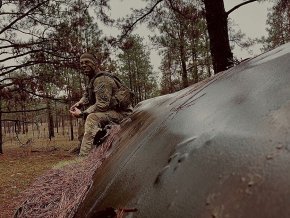
A close call and a change of direction
A mid-air parachute malfunction is not something most people walk away from, but Sgt. Hayden Anderson ’24 — formerly a team leader and Airborne Ranger with the U.S. Army 4/25 1-501 Battalion Delaware Company — isn’t most people.

“I spent most of my enlistment on base in Alaska, but every year we’d go to Louisiana or Texas for training missions,” Anderson explained. “We had to be ready for deployment at any time.”
During one such exercise at Fort Hood in Texas, Anderson’s unit was assigned to chart the area from their plane before doing a nighttime jump into an improvised drop zone after three hours in the air.
“One of the seats flipped down from the wall, and I tripped as I was getting to the door for my jump,” Anderson said. “I was a little disoriented when the jump master put me out the door, almost backward, then my parachute didn’t open all the way.”
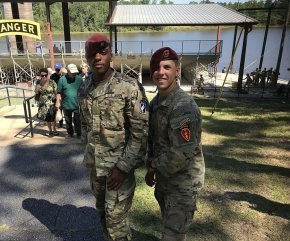
Anderson landed on top of another soldier’s parachute, which he described as similar to landing on a trampoline. Because it was a night mission, Anderson maneuvered toward the middle of the other parachute instead of the corner as he’d been trained to do, which caused him to slide off into the air again.
“I landed in the middle of a field, and through that whole jump, my parachute never opened fully,” Anderson said. “I could hear noise off to my left. I thought it was my guys, so I tried to call to them and tell them I was hurt. Then with my night-vision goggles, I could see I was in a field with two or three good-sized bulls sitting to my left.
Eventually reunited with his team, Anderson didn’t know the full extent of his injuries for two more years. He wanted to serve, so he worked through the pain and went to Ranger School, which the Army considers one of its most challenging training courses.
“Completing Ranger School was my single greatest military accomplishment,” he said.
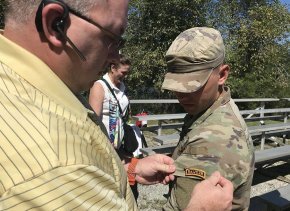
Only when Anderson began the process of transferring from the Army to the Air Force Pararescue unit, did a full-body MRI scan reveal the extensive damage to his spine and hip.
“The guy came out of the booth and told me, ‘I’m sorry, but I can’t put your application through any further,’” Anderson shared. With his military career over after four years, Anderson returned to South Carolina where he worked in marketing and sales for a custom auto restoration firm, but he knew he’d need a degree to go further.
“I had a friend at Lenoir-Rhyne who invited me to visit, so I did,” Anderson said. “I got transfer credits for my military experience, and I’ve always been connected to sports, so I decided to major in sports management.”
This semester Anderson is working as an intern in the weight room, helping all the teams with training and conditioning setting up training programs and lifts, and cueing movements.
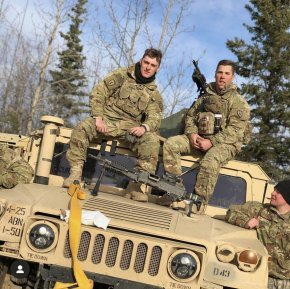
“I monitor them, and I monitor myself,” he said. “The value of going through the recovery I have is that I can pass along what I’ve learned, take care of my athletes and help them take care of themselves.”
After the internship this semester, Anderson has a job waiting for him with a baseball training facility in Conover, North Carolina. Campus resources have helped him learn to market himself as he considers his workplace and graduate school opportunities after graduation.
While college is very different from military life, Anderson believes his time in the Army prepared him to focus on his assignments and manage his time effectively. He gives special credit to Kim Oder, the coordinator for veterans’ education in the registrar’s office, for her support with the executive tasks of enrollment.
“I had to re-learn how to study, how to write papers, that kind of thing,” he said. “At the same time, I feel like I got here with a sense of maturity and confidence because I’ve accomplished so much already.”
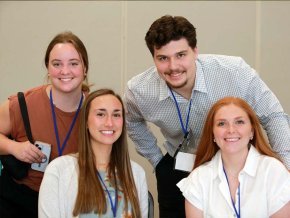
Lenoir-Rhyne University students showcased their academic excellence and research expertise at the 2025 North Carolina Academy of Science (NCAS) annual meeting in late March.
View More
For graduate assistant Lucas Quinn, M.A. '25, Carl A. Rudisill Library is more than a workplace — it’s a space for leadership, advocacy, and community.
View More